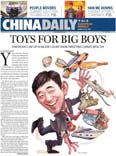Economy
US debt downgrade casts shadow over China's assets
Updated: 2011-04-21 13:50
(Xinhua)
BEIJING - Safety worries were raised about the assets of China, the biggest holder of United States Treasury bonds, after a key credit agency cut the outlook on the US sovereign debt to negative.
China, which has always demanded that the US ensure the security of its dollar assets, expressed concerns after Standard & Poor on Monday lowered the long-term US credit outlook from "stable" to "negative" and warned of risks, including spiking deficits and public debt.
Foreign Ministry spokesman Hong Lei said on Tuesday that China had "noted" the S&P's move and expressed hope that the US administration could adopt "responsible policies and measures" to protect the interests of investors.
|
||||
In February of this year, China remained the largest buyer of US Treasury securities, after the country cut its holdings for four consecutive months to $1.15 trillion, according to the latest data from the US Treasury Department.
Early in November of last year, when the US government announced a new round of quantitative easing, or QE2, China's domestic ratings agency, Dagong Global Credit Rating Co Ltd, downgraded the sovereign credit rating of the US by one level to A+ from the previous AA, with a "negative" outlook on the US's deteriorating debt repayment capability and the drastic decline of the US government's intention of debt repayment.
Guan Jianzhong, Dagong's chairman, said that he was not surprised to see the S&P's cut on the US ratings outlook. "The US economic fundamentals are not strong, plus there is expanding fiscal deficit and declining financial revenue," he said.
But Guan said that the S&P move is more likely a warning to the US administration on the massive federal deficit, instead of an actual downgrade in its sovereign rating.
Currently, the S&P maintains the US's top AAA credit rating, but said there is a one-in-three chance it could cut its long-term credit rating within two years if US policy makers fail to deal with rising budget deficit and debt.
Guan said that the US economy was still worsening after Dagong downgraded the country's rating last year, due to the military missions in Libya, as well as rising defense budget and fiscal expenditures.
China's holding of dollar assets is risky, he warned.
"We are closely tracking the performance of US government bonds and considering a further adjustment based on current conditions," Guan added.
Moody's Investors Service Inc, another leading ratings agency, warned of the same debt risk in the United States.
"Moody's rating for the US is AAA and remains stable, but an upward debt trajectory and increasing fiscal pressures increase the likelihood of an outlook change within the next two years," said Steve Hess, Senior Credit Officer with Moody's.
But Moody's was more positive over the future development of the US economy.
In its latest weekly credit outlook report, the ratings agency wrote that "despite these uncertainties, we view the changed parameters of the debate with broadly similar goals as to government debt levels as a turning point that is positive for the long-term fiscal position of the US federal government."
Some Chinese economists were also optimistic on the US debt risk. Yang Tao, a researcher with the Chinese Academy of Social Sciences, said that currently there is little chance for a US debt crisis, unless all of the bond holders sold their US Treasury bonds, which would hurt the interests of all nations.
Lu Zhengwei, chief economist with Industrial Bank Co Ltd, said that the country's debt repayment capability will become better once the United States posts a better-than-expected economic recovery.
Lu also called for the Chinese government to urge the US administration to take full responsibility for its debt, as well as the global economic development and financial system.
Economists and researchers also noted that China should pay close attention to the development of the US credit conditions and diversify its investments of its massive foreign reserves.
Chinese central bank governor Zhou Xiaochuan said earlier at a forum in Beijing this week that China's foreign exchange reserves, which had topped $3 trillion in March, have exceeded the country's "reasonable" demand and the government should improve the management and especially the diversification of its holdings.
E-paper

Han me downs
Traditional 3,000-year-old clothes are making a comeback.
Preview of the coming issue
Reaching out
Fast growth fuels rise in super rich
Specials

25 years after Chernobyl
Belarus, Ukraine and Russia will mark the 25th anniversary of the nuclear reactor explosion in Chernobyl.

Luxury car show
The world's most prestigious luxury, sports cars and supercars are displayed in Monaco.

Peking Opera revival
Traditional opera is enjoying a revival in Beijing thanks to some modern touches.



